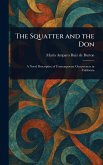In "The Squatter and the Don," María Amparo Ruiz de Burton weaves a rich tapestry of 19th-century Californian life, juxtaposing the experiences of the Anglo-American squatter with those of the indigenous Californio elite. Through her deft use of realism infused with social commentary, Ruiz de Burton captures the cultural and racial tensions emerging during Mexico's loss of California to the United States. The novel's vivid characters and plot intricacies reveal the ripple effects of land dispossession and the erosion of Mexican identity, offering readers a profound glimpse into the intersection of personal and political narratives in a rapidly changing society. María Amparo Ruiz de Burton, a ground-breaking figure in American literature, was the first published Mexican-American novelist. Her unique heritage, encompassing both Anglo-American and Californio backgrounds, provides a crucial lens through which to understand her work. Living through the tumultuous period of the Mexican-American War and the subsequent annexation, Ruiz de Burton's personal experiences deeply informed her motivations for addressing issues of identity, land, and power dynamics in her writing, allowing her to express the complexities faced by her community. "The Squatter and the Don" is a must-read for those interested in the intersections of race, class, and history, as well as the voices of marginalized communities in American literature. Ruiz de Burton's pioneering perspective offers invaluable insights into her characters' struggles, making this novel not only a compelling narrative but also a significant socio-historical document.
Bitte wählen Sie Ihr Anliegen aus.
Rechnungen
Retourenschein anfordern
Bestellstatus
Storno








